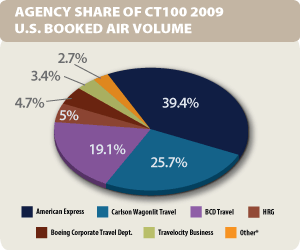The deep cuts in corporate travel spending that began for
most companies in the second half of 2008 were only a prelude to the further
bloodletting that they experienced in their 2009 U.S. booked air volumes, on
which this 2010 ranking is based.
In fact, the bottom fell out for the Corporate Travel 100
this year, as the threshold for inclusion among the biggest U.S. business
travel spenders fell not only below the $40 million mark, which constituted the
lowest volume on the list for the past several years, but the last five
companies on the list this year were below the previous longtime low-watermark
of $30 million.
The last time the bottom of the Corporate Travel 100 fell
below $30 million was in the 1996 issue, when the 100th largest 1995 U.S.
booked air volume reported was $26 million. This year, two companies are tied
at the bottom at $28 million.
This 23nd annual Corporate Travel 100 benchmarking report
shows a 21 percent decline in overall spending for the group to $8.1 billion in
2009 from $10.3 billion in 2008, following an 8 percent drop from $11.2 billion
in 2007. While that overall average drop is in keeping with other industry
figures for the hit to demand in 2009, in many cases companies on this list
experienced year-over-year reductions in air spending of more than 30 percent,
with some even registering reductions of more than 50 percent.
Spending cuts took several longtime CT100 companies off this
year's list, while others fell out from the more traditional merger and
acquisition activity. Among the former were ABB, AIG, Caterpillar, Eaton, Royal
Philips Electronics and Toyota and the latter included BearingPoint, Hoffman-La
Roche and Wyeth. Appearing on the list for the first time ever are AECOM
Technology, Jacobs Engineering, Publicis and Genentech, which merged with
Hoffman-La Roche.
The deep cuts were less apparent at the top of the list,
where perennial airline spending leader IBM held steady and last year's
runner-up, Boeing, actually reported a $55 million rise in travel spending.
Last year's top six retained their pecking order, but acquisitions led Bank of
America to jump to seventh from 25th last year, while aggressive cost control
moved last year's number nine, Johnson & Johnson, to 20th this year.
We based our rankings on air tickets bought at the U.S.
point of sale, as we have for more than 15 years. The overwhelming majority of
companies on this list provided that information, as well as other details
about preferred vendors, program accomplishments and goals and policy changes,
through phone interviews and questionnaire responses. For companies that did
not participate, BTN used industry
sources and published reports and gave companies the opportunity to improve the
accuracy of its estimates and listings prior to publication. Data represent
U.S. business travel operations for the most recent full year, 2009.
 BTN also annually
measures Corporate Travel 100 company marketshare for travel management
companies (see chart), which compared with last year shows no real change in
position, but with American Express slipping slightly from 41 percent last year
and CWT, BCD and HRG gaining only 1 percent, 0.6 percent and 1.2 percent,
respectively. At least 7 companies on the list still use the BTI network
globally, but those clients all use BCD Travel to consolidate U.S.-based
operations and HRG in most other locations. BTN
deferred to client preference in listing companies' consolidated agency as BTI
or BCD, but all were counted as BCD for the U.S. marketshare chart.
BTN also annually
measures Corporate Travel 100 company marketshare for travel management
companies (see chart), which compared with last year shows no real change in
position, but with American Express slipping slightly from 41 percent last year
and CWT, BCD and HRG gaining only 1 percent, 0.6 percent and 1.2 percent,
respectively. At least 7 companies on the list still use the BTI network
globally, but those clients all use BCD Travel to consolidate U.S.-based
operations and HRG in most other locations. BTN
deferred to client preference in listing companies' consolidated agency as BTI
or BCD, but all were counted as BCD for the U.S. marketshare chart.
Click here to
download the ranking of 2010 Corporate Travel 100 companies. Please click here to download the detailed
report of each CT100 company, and please click here to view the Corporate Travel 100 digital edition.